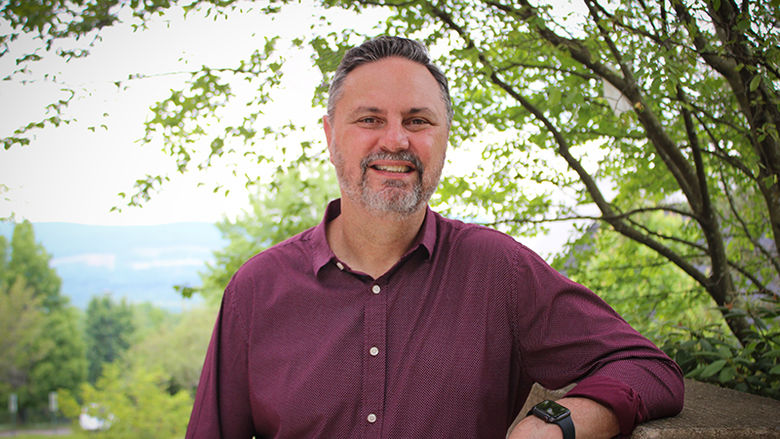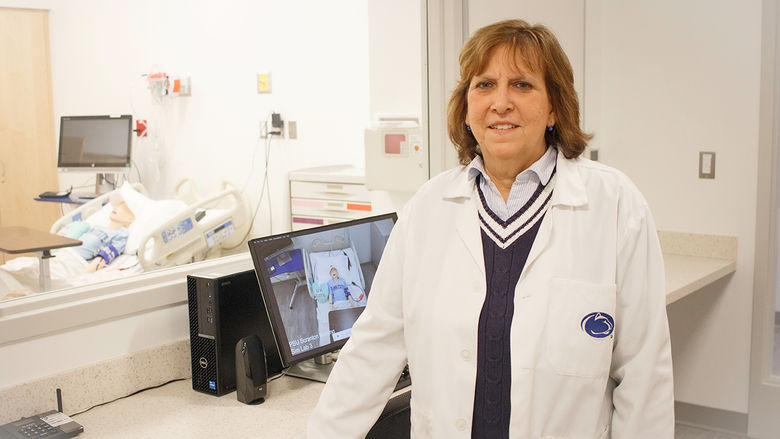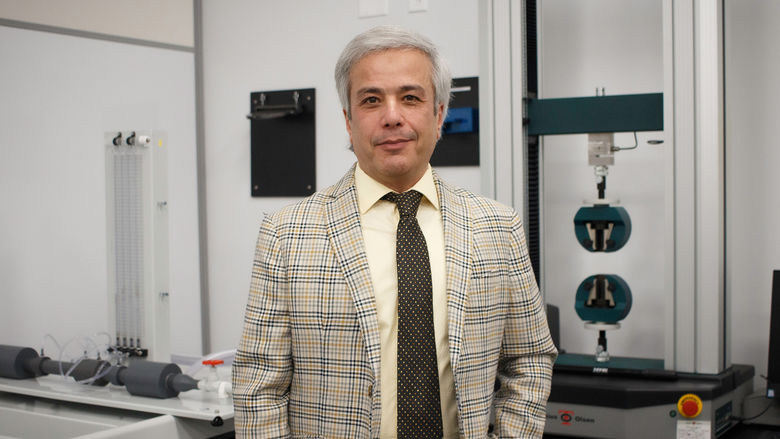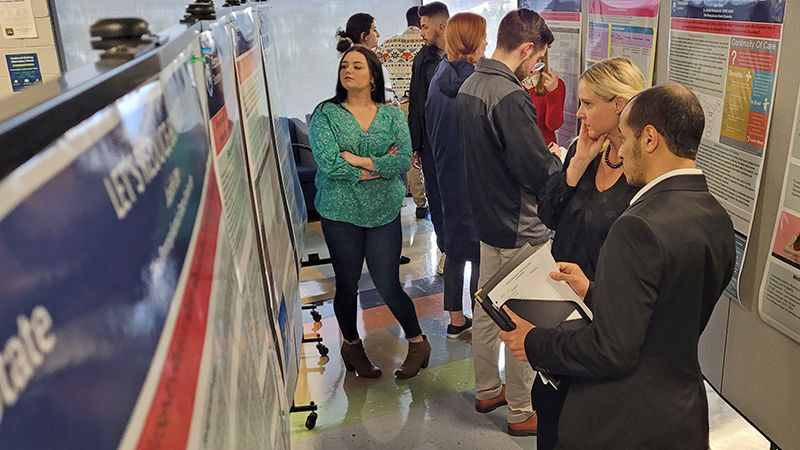

This dialog contains the full navigation menu for this site.

It doesn’t take place until April but planning and preparation for the campus’ annual Undergraduate Research Fair and Exhibition starts at the very beginning of the spring semester, in January, with students and faculty starting work on their projects, and organizers doing all of the “behind the scenes” tasks necessary to make each year’s event a success.
This year’s fair was especially celebratory because it was the first time the fair has been held on campus in three years. The 2020 and 2021 fairs were both held virtually due to the Covid-19 pandemic. One result is that now, in addition to the in-person, on-campus event, the campus has decided to continue to showcase the projects virtually for those who may be unable to attend, and they can also check out previous years’ submissions – garnering even more attention for the projects students work so hard on.
To see everything this year’s Undergraduate and Research Fair and Exhibition had to offer, click here.
A total of 112 students participated this year, entering 78 poster presentations, six oral presentations, six creative works, 12 visual arts projects and 28 exhibition participants which are not judged.
Participants this year displayed posters from a wide range of categories and a varied reach in subject matter and which benefitted local organizations and businesses. Subject areas included Nursing, Science, Social Sciences, Technology and Technology and Engineering.
IST students Alexander Hamilton, Trusha Patel, Demitri Reece, Keshi Patel worked on the “Dress for Success Inventory Management” project, which benefitted the non-profit Dress For Success, created a web-based inventory management application aimed at helping the organization manage their inventory with more efficiency and accuracy, and minimizing human error.
Other projects dealt with the impact of the Covid-19 pandemic:
In the Visual Arts category, students submitted colorful, creative art works featuring everything from landscapes to dragons to plant life. Submissions can be seen here.
This year’s winners and their submissions are:
Nursing: Health and Aging
1st Place: Olivia Maikranz -- “The Effectiveness of Music-Based Interventions in Addition to Pharmacological Interventions To Manage Behavioral and Psychological Symptoms of Dementia” (Advisor: Khalid Almasloukh)
2nd Place: Nicole Swanson -- “Reducing Hypertension in Adults” (Advisor: Khalid Almasloukh)
Nursing: Injury and Disease
1st Place: Kayla Kozlowski -- “Efficacy of Needle Exchange Programs” (Advisor: Khalid Almasloukh)
2nd Place: Logan DeSanto -- “Stories from Nurses on the Front Lines of the COVID-19 Pandemic” (Advisor: Michael M. Evans)
Nursing: Prenatal and Pediatrics
1st Place: Megan Lucey -- “Copper or Hormonal Intrauterine Device: Which Has Fewer Side Effect” (Advisor: Khalid Almasloukh)
2nd Place: Johnnah Carr -- “The Impact of Breastfeeding on Infants Experiencing Neonatal Abstinence Syndrome (NAS)” (Advisor: Khalid Almasloukh)
Science
1st Place: Sarah D. Sherpinskas -- “Using Brassica rapa mutants to measure the long-term effects of pollinator declines: First steps” (Advisor: Megan Van Etten)
2nd Place: Alexandria DeWolfe, Marston Jamieson -- “Plant Interactions Perceived as Stress Relieving During COVID-19 Pandemic” (Advisor: Megan Van Etten)
Social Science
1st Place: Elizabeth Trojan -- “Violence/Risk Assessments and Incarcerated Offenders: Examining the Reliability and Validity of the PCL-R” (Advisor: Renae McNair)
2nd Place: Kaylah Simmons -- “The Psychological Influences Behind the Fear of Phone Detachment Among Teens Using the Nomophobia Questionnaire” (Advisor: Renae McNair)
Technology and Engineering
1st Place: Timothy Nelson, Michael Border, Alexandria Trinovitch -- “3D-printed Spring-like Novel Bar Mechanism for Simplifying the Design of Robotic Grippers” (Advisor: Mizanoor Rahman)
2nd Place: Michael V Mancuso, Kyle Bosley, Ryan Blanchard -- “The Truth Behind VPN: Is It Worth Your Money?” (Advisor: Marilee Mulvey)
Oral Presentations
1st Place: Marie LaRosa -- “Relationship” (Advisor: Jody Griffith)
2nd Place: Angelo Corradino -- “How Ace Attorney Uses Elements of the Graphic Novel” (Advisor: Kelley Wagers)
Visual Arts
1st Place: Maria Veniamin -- “Making Purple” (Advisor: Corianne Thompson)
2nd Place: Amanda Delhagen -- “Coming undone” (Advisor: Corianne Thompson)
University Libraries’ Undergraduate Research Award for Excellence in Information Literacy
1st Place: Alexandria DeWolfe, Marston Jamieson -- “Plant Interactions Perceived as Stress Relieving During COVID-19 Pandemic” (Advisor: Megan Van Etten)
Runners Up:
Marceia Tanzini – “Scientific Motherhood” (Advisor: Kelley Wagers)
Marie LaRosa – “Relationship” (Advisor: Jody Griffith)
Aless Jellan Agojo -- “Catheter-Associated Urinary Tract Infections Prevention in Older Adults” (Advisor: Khalid Almasloukh)
Elizabeth Trojan -- “Violence/Risk Assessments and Incarcerated Offenders: Examining the Reliability and Validity of the PCL-R” (Advisor: Renae McNair)
Kimberlyn Sanchez -- “Maternal Gatekeeping Shortly After Separation and Divorce” (Advisor: Ray Petren)
Claire Taylor -- “Food During Labor” (Advisor: Khalid Almasloukh)
Last fall, Maria Veniamin was given an assignment for Business Writing class: a business report on an organization and an issue they were having, and come up with a solution to that problem.
The assignment came just after Penn State had announced that in the following semester, the traditional week-long spring break would be replaced with three wellness days instead.
"And my first thought to that news was, my community is going to be exhausted. And so I approached Dr. Tettenborn (associate professor of English) and I said, 'Dr. Tettenborn, I would like to write my report on a solution to the lack spring break that our campus will face next semester.'"
After receiving approval for her project, Veniamin prepared to hunker down in her room for a few days to do the research and work required for her project.
"I researched," she said. "I researched exhaustion in general.I researched exhaustion in the academic world. But I didn’t just research for students' exhaustion. I wrote this report for my community. My friends, my professors and the staff."
At the end of her research, the solution Veniamin came up with was to pair each wellness day with a light work day following it. Professors could teach class and make assignments, but they could not have any work due on the light work day, in order to allow everyone to have a restful night and make the best possible use of the wellness day.
She turned in her project and anxiously awaited her grade. When she received it, she was shocked. "Not only had I gotten a 100 percent on my paper, but a note had been left for me on the side." The note was from Tettenborn, and is said, “Maria, I really liked your solution. And I have shared your idea with my fellow faculty members. But don’t worry, I have kept you anonymous.”
The fall semester ended and as students returned for the spring semester and got back to classes and studying, Veniamin began to receive texts from her friends and fellow students telling her that their professors had included a light work week in their syllabi.
"What’s with that?" they asked her. "Do you know anything about that?"
"I mean, I might know a little about that," Veniamin giggled, as she retold the story, while keeping it quiet that the light work day had been her idea.
"But," she told the crowd at last week's Undergraduate Research Fair and Exhibition, "I tell you this story today not for what I did, but because of the passion that I had for my research. I know the students presenting today have [that same passion] for theirs. As undergraduate researchers, we are mainly focused on honing our researching skills. We are not professionals. But we are passionate. And as I look around this room today, I see who I so passionately wrote my research for."
The judges for this year's Undergraduate Research Fair and Exhbition had their work cut out for them, as they had to judge 78 poster presentations, six oral presentations, six creative works and 12 visual arts projects and select the top projects in each category.
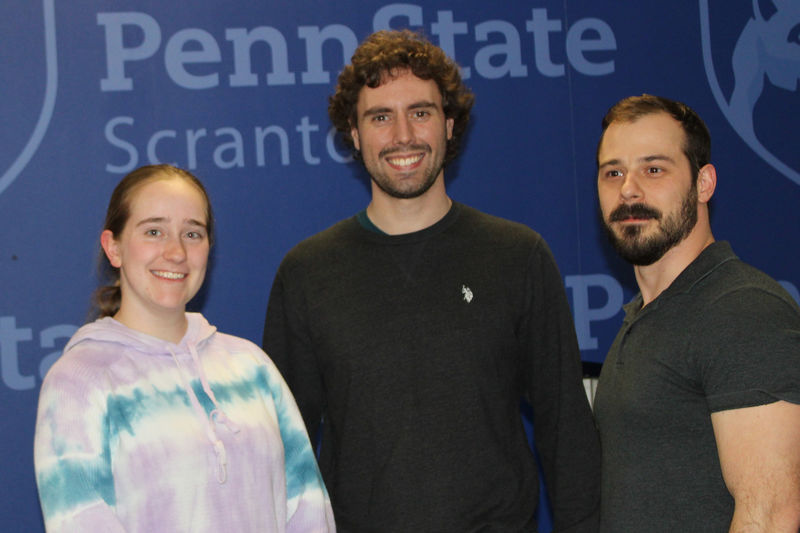
First-place winners in the Technology and Engineering category Alexandra Trinovitch, Timothy Nelson and Michael Border receive their awards for their project: "3D-printed Spring-like Novel Bar Mechanism for Simplifying the Design of Robotic Grippers”.
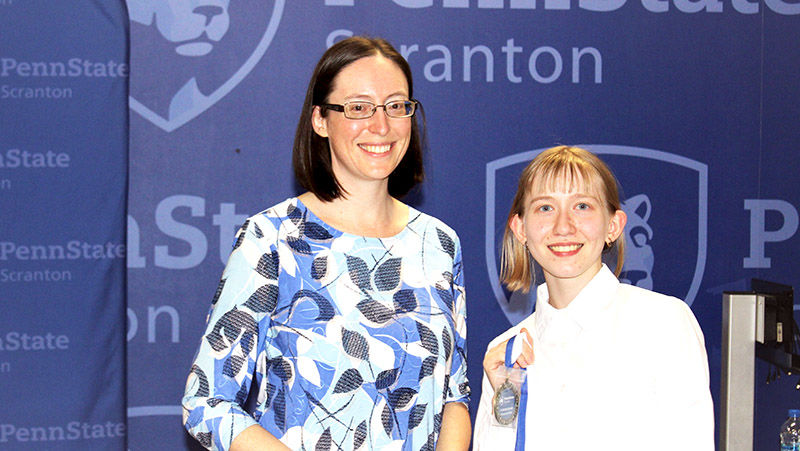
Nursing major Megan Lucey receives her first place award in the Nursing: Prenatal and Pediatrics category from UGR fair coordinator Meg Van Etten for her project, “Copper or Hormonal Intrauterine Device: Which Has Fewer Side Effect”.
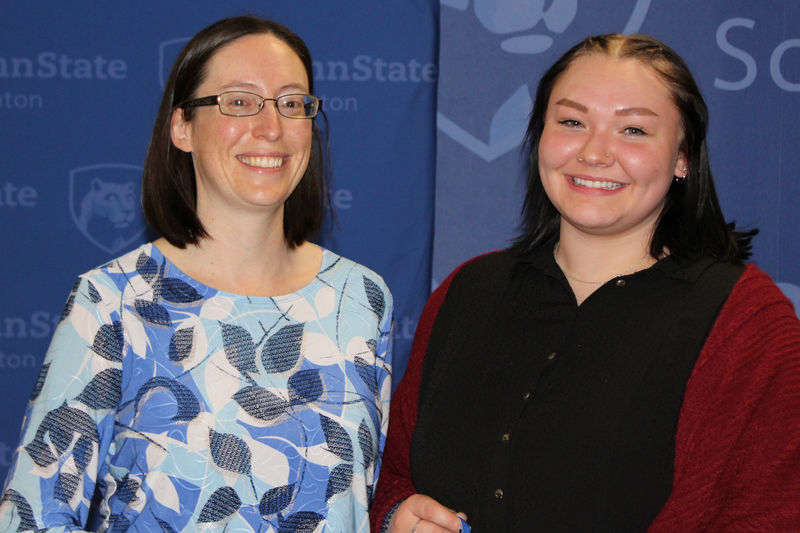
UGR Fair Coordinator Meg Van Etten presents Kayla Kozlowski with her first place award in Nursing: Injury and Disease for her project, Efficacy of Needle Exchange Programs”.
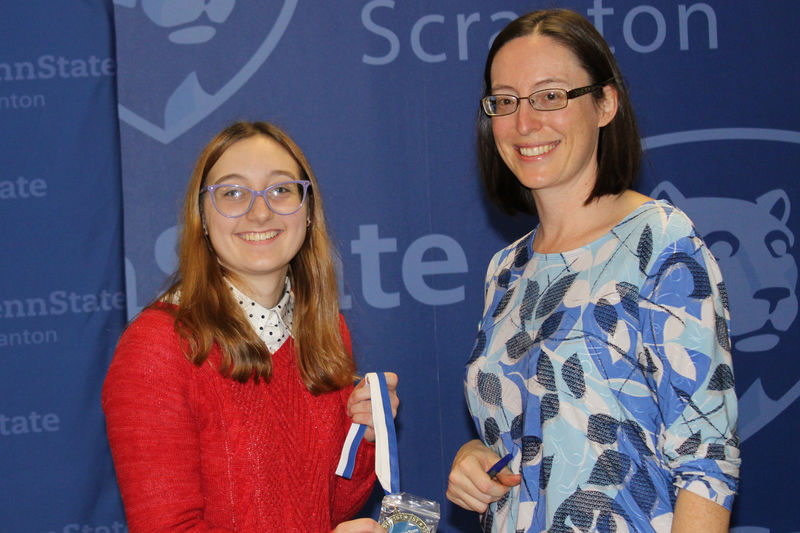
Olivia Maikranz receives her first place award in the Nursing: Health and Aging category for her project, "The Effectiveness of Music-Based Interventions in Addition to Pharmacological Interventions To Manage Behavioral and Psychological Symptoms of Dementia”.
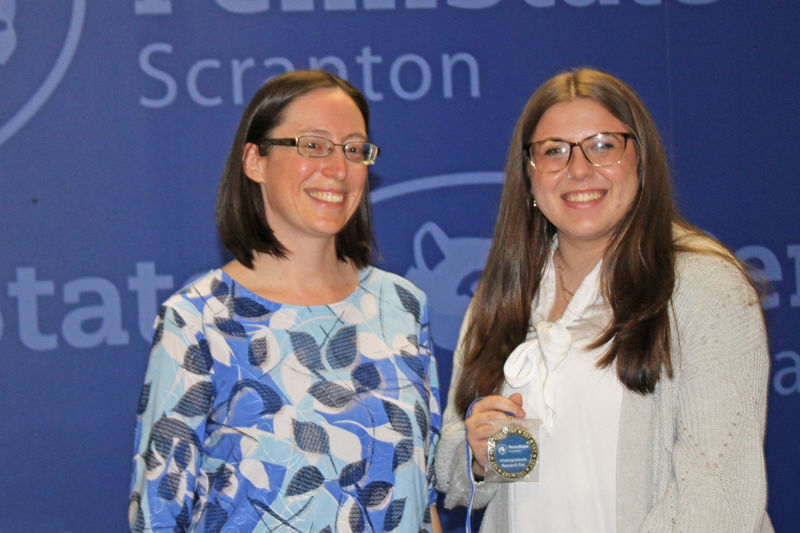
UGR Fair coordinator Meg Van Etten presents Sarah Sherpinskas her first place award in science for her project: “Using Brassica rapa mutants to measure the long-term effects of pollinator declines: First steps”.
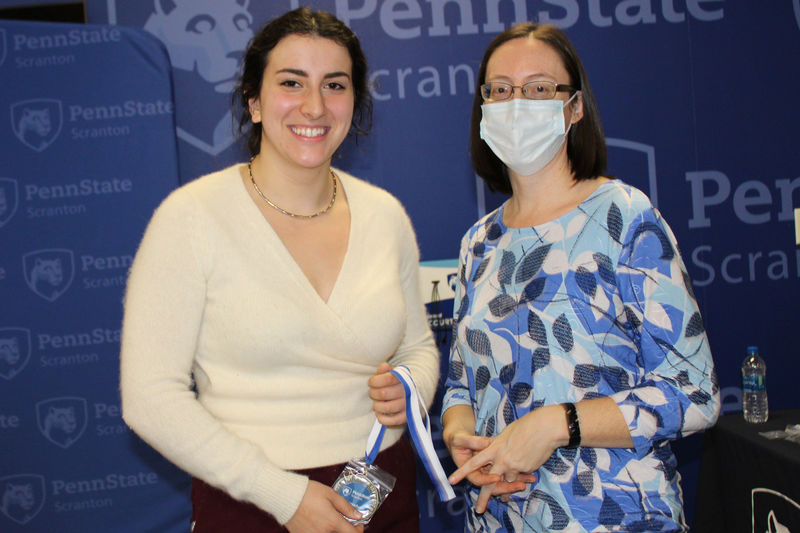
Marie LaRosa accepts her first place award in Oral Presentations from fair coordinator Meg Van Etten, for “Relationship”.
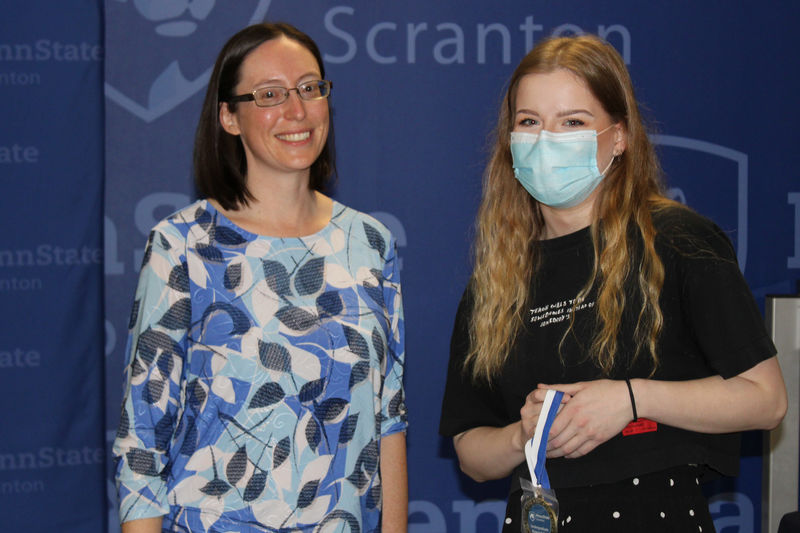
Elizabeth Trojan accepts her first place award in social science from fair coordinator Meg Van Etten for her project, "Violence/Risk Assessments and Incarcerated Offenders: Examining the Reliability and Validity of the PCL-R”.
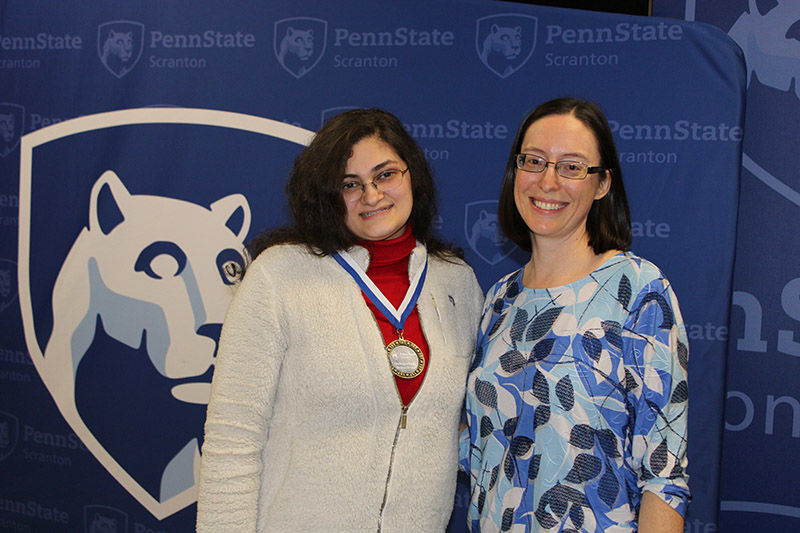
Corporate Communication major Maria Veniamin, who in addition to presenting at this year's fair was also an opening speaker for the event, garnered first place in the Visual Arts category, for her project "Making Purple”. In her remarks, Veniamin shared her personal experience and the satisfaction she felt after completing a research project for a class report last semester that resulted in faculty at Penn State Scranton adopting her solution to student exhaustion. (see sidebar story)
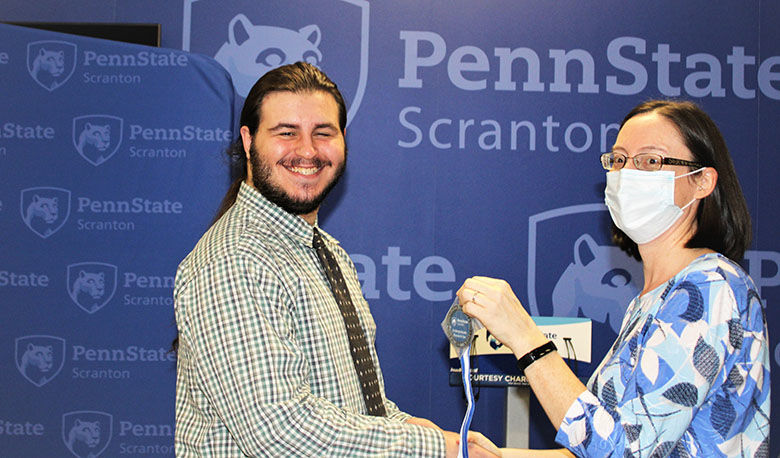
Angelo Corradino accepts his second place award for his oral presentation, "How Ace Attorney Uses Elements of the Graphic Novel” from Meg Van Etten, Undergraduate Research Fair coordinator.
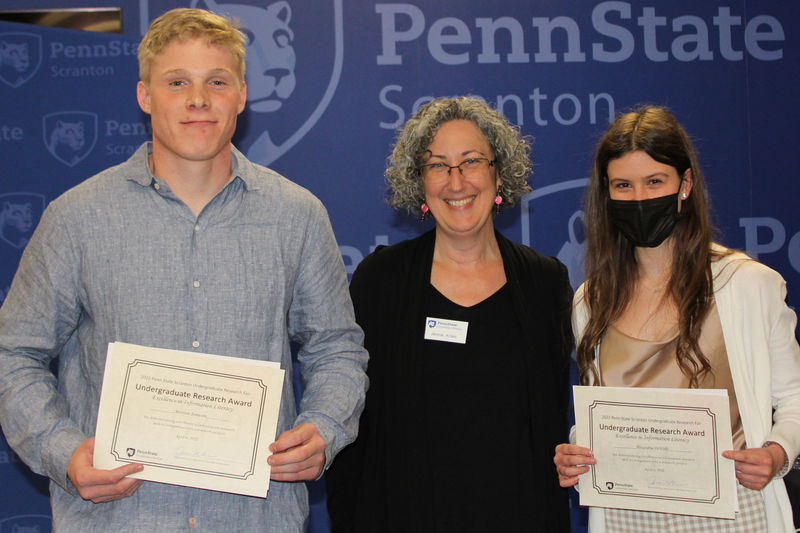
Marston Jamieson and Alexandria DeWolfe receive their first place University Libraries' Undergraduate Research Award for Excellence in Information Literacy for their project, "Plant Interactions Perceived as Stress Relieving During COVID-19 Pandemic".
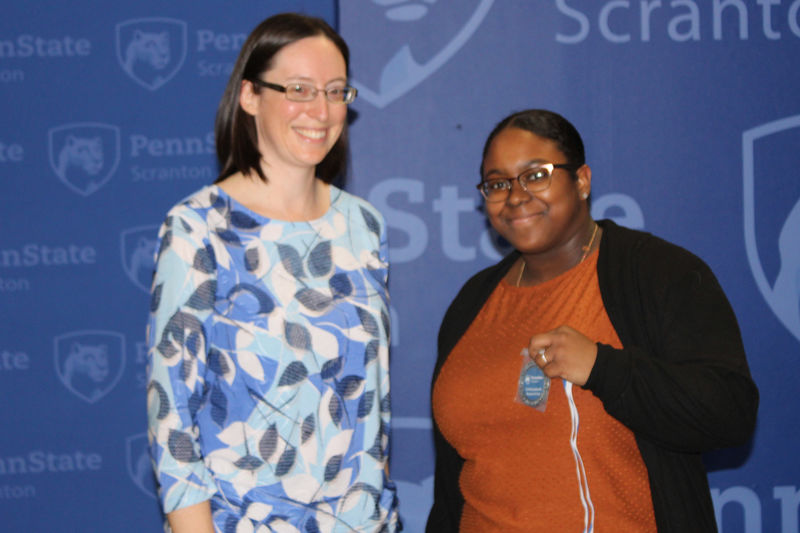
Kaylah Simmons receives her second place award in social science from Fair Coordinator Meg Van Etten for her project, “The Psychological Influences Behind the Fear of Phone Detachment Among Teens Using the Nomophobia Questionnaire”.
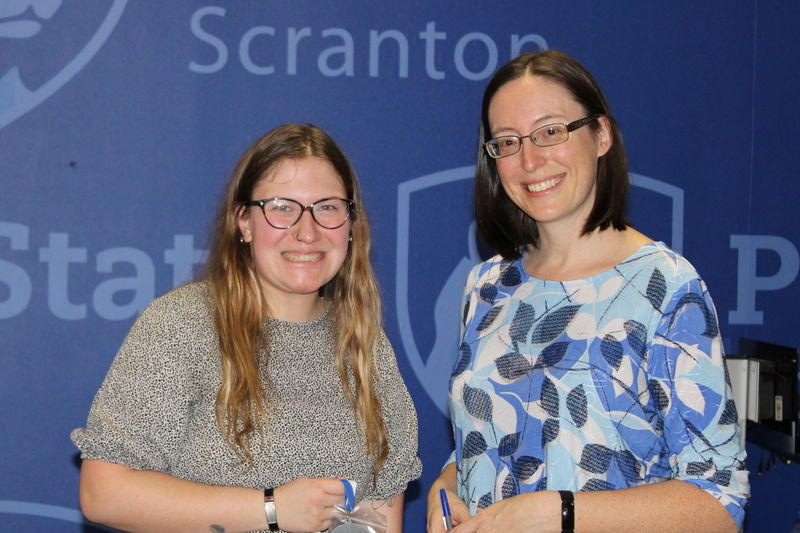
Johannah Carr receives her second place award for her Nursing: Prenatal and Pediatrics project, “The Impact of Breastfeeding on Infants Experiencing Neonatal Abstinence Syndrome (NAS)”.
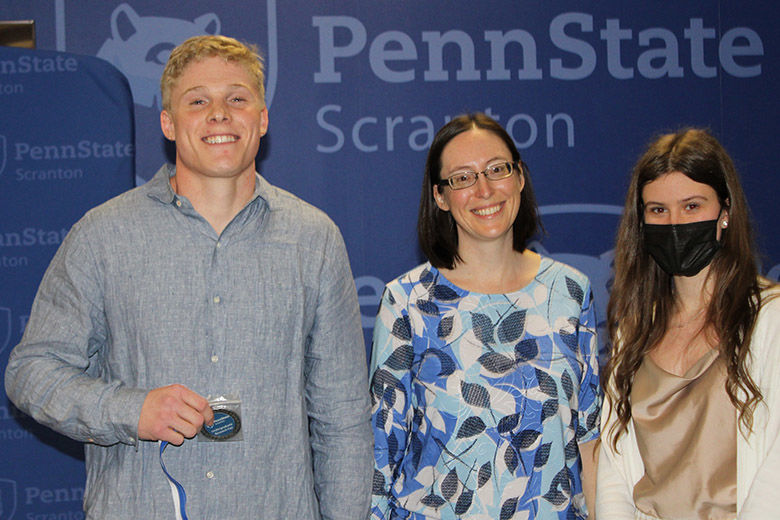
Marston Jamieson and Alexandria DeWolfe receive their second place award in science award from UGR fair coordinator Meg Van Etten for their project, “Plant Interactions Perceived as Stress Relieving During COVID-19 Pandemic”.
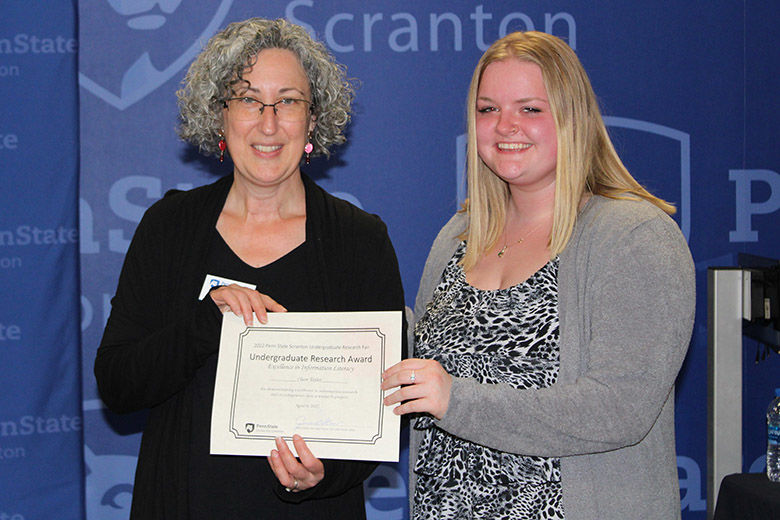
Librarian Jennie Knies presents Claire Taylor with her runner-up award for the Univesity Libraries' Undergraduate Research Award for Excellence in Information Literacy for her project, Claire Taylor -- “Food During Labor”.
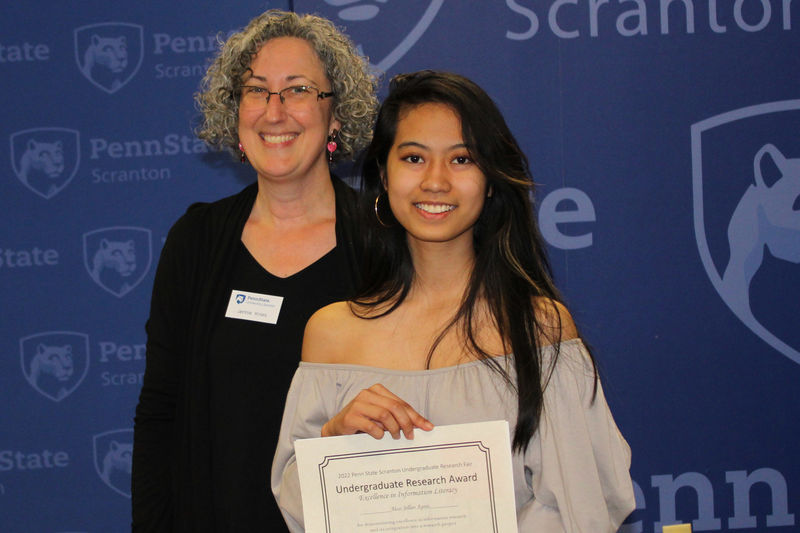
Penn State Scranton Head Librarian Jennie Knies presents Aless Jellan Agojo her certificate for earning a runner-up spot in the University Libraries' Undergraduate Research Award for Excellence in Information Literacy for her project: Catheter-Associated Urinary Tract Infections Prevention in Older Adults.”
